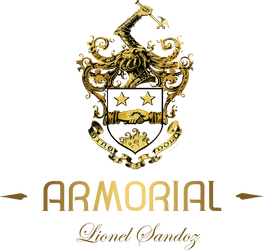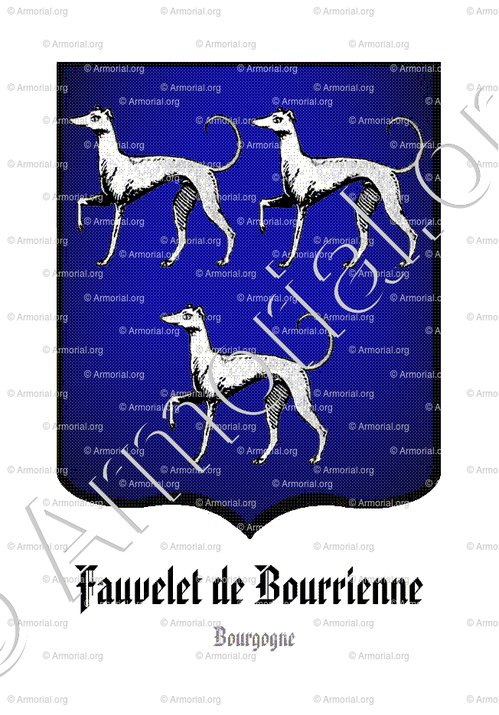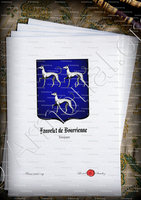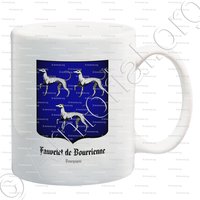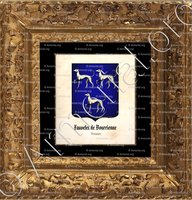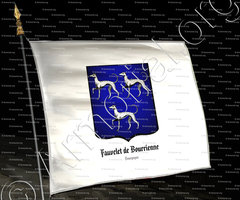DESCRIPTION
FAUVELET DE BOURRIENNE
Bourgogne
France
Armoiries:
" D'azur, à trois lévriers passants d'argent. "
Sources héraldiques :
- Armorial général d’Europe, par J.B. Rietstap (Gouda, 1861).
- Armorial d'Europe par J.B. Rietstap (Gouda, 1884, Berlin, 1934) (Gouda, 1887, Berlin 1937).
- Armorial général J.B. Rietstap, illustré par Victor et Henri Rolland (1903-1926). Colorisé par Lionel Sandoz (1993-2002).
- Le Grand Armorial de France, par Jougla de Morénas 1935-1943, de Warren, Frantzen 1960.
Note historique et biographique :
Louis Antoine FAUVELET DE BOURRIENNE (Sens, 19 juillet 1769 - Caen, 7 février 1834), est un diplomate et homme politique français. Sa famille appartient au patriciat de la ville de Sens (Yonne) depuis le xve siècle. Elle entre notamment en possession du petit fief de Bourienne, situé à Marsangy, village en amont de la cité. Ce fief sera attribué à une branche du lignage.
Symbolique du blason:
- D'azur : Le fond du blason est bleu. En héraldique, la couleur bleue (azur) symbolise la loyauté, la vérité, et la persévérance.
- À trois lévriers passants : Le blason comporte trois lévriers en position de marche (passants).
- Lévrier : Le lévrier est un chien de chasse réputé pour sa vitesse et son élégance. En héraldique, il représente la vigilance, la fidélité, et la bravoure.
- Passant : La position "passant" signifie que l'animal est représenté marchant vers la gauche (de la perspective du spectateur), avec une patte avant levée.
- D'argent : Les lévriers sont de couleur argent (blanc en héraldique). La couleur argent symbolise la pureté, la sagesse, et la paix.
Résumé de la symbolique :
Le blason "D'azur, à trois lévriers passants d'argent" peut être interprété comme représentant une famille ou une lignée valorisant la loyauté, la vérité, la fidélité, et la bravoure, avec un engagement envers la pureté et la paix.
Etymologie:
Le patronyme "Fauvelet" est d'origine française et se compose de plusieurs éléments linguistiques.
1° Le terme "fauve" provient du latin "falcus", qui signifie "faucon". En ancien français, "fauve" a également désigné une couleur fauve, c'est-à-dire une teinte brune ou jaunâtre rappelant la couleur du pelage de certains animaux sauvages. Le mot peut également se référer à un animal sauvage lui-même.
2° Le suffixe "-let" est un diminutif en ancien français. Il est souvent utilisé pour indiquer quelque chose de plus petit ou de plus jeune, ou pour donner un caractère affectueux ou familier.
En combinant ces éléments, "Fauvelet" pourrait donc se traduire littéralement par "petit fauve" ou "jeune fauve".
____________________________________
FAUVELET DE BOURRIENNE
Burgundy
France
Coat of Arms:
"Azure, three greyhounds passant argent."
Heraldic Sources:
- Armorial général d’Europe, by J.B. Rietstap (Gouda, 1861).
- Armorial d'Europe by J.B. Rietstap (Gouda, 1884, Berlin, 1934; Gouda, 1887, Berlin, 1937).
- Armorial général by J.B. Rietstap, illustrated by Victor and Henri Rolland (1903-1926). Colored by Lionel Sandoz (1993-2002).
- Le Grand Armorial de France, by Jougla de Morénas 1935-1943, de Warren, Frantzen 1960.
Historical and Biographical Note:
Louis Antoine FAUVELET DE BOURRIENNE (Sens, July 19, 1769 - Caen, February 7, 1834) was a French diplomat and politician. His family belonged to the patriciate of the city of Sens (Yonne) since the 15th century. They acquired the small fief of Bourienne, located in Marsangy, a village upstream from the city. This fief was assigned to a branch of the lineage.
Symbolism of the Coat of Arms:
- Azure: The background of the coat of arms is blue. In heraldry, the color blue (azure) symbolizes loyalty, truth, and perseverance.
- Three greyhounds passant: The coat of arms features three greyhounds in a walking position (passant).
- Greyhound: The greyhound is a hunting dog known for its speed and elegance. In heraldry, it represents vigilance, fidelity, and bravery.
- Passant: The "passant" position indicates that the animal is depicted walking to the left (from the viewer's perspective), with one foreleg raised.
- Argent: The greyhounds are silver (white in heraldry). The color silver symbolizes purity, wisdom, and peace.
Summary of Symbolism:
The coat of arms "Azure, three greyhounds passant argent" can be interpreted as representing a family or lineage that values loyalty, truth, fidelity, and bravery, with a commitment to purity and peace.
_Symbolism of the Coat of Arms:
- Azure: The background of the coat of arms is blue. In heraldry, the color blue (azure) symbolizes loyalty, truth, and perseverance.
- Three Greyhounds Passant: The coat of arms features three greyhounds in a walking position (passant).
- Greyhound: The greyhound is a hunting dog renowned for its speed and elegance. In heraldry, it represents vigilance, fidelity, and bravery.
- Passant: The "passant" position indicates that the animal is depicted walking to the left (from the viewer's perspective), with one front paw raised.
- Argent: The greyhounds are silver (white in heraldry). The color silver symbolizes purity, wisdom, and peace.
Summary of the Symbolism:
The coat of arms "Azure, three greyhounds passant argent" can be interpreted as representing a family or lineage valuing loyalty, truth, fidelity, and bravery, with a commitment to purity and peace.
Etymology:
The surname "Fauvelet" is of French origin and consists of several linguistic elements.
1. The term "fauve" comes from the Latin "falcus," meaning "falcon." In Old French, "fauve" also referred to a tawny color, a brownish or yellowish hue reminiscent of the fur of certain wild animals. The word can also refer to a wild animal itself.
2. The suffix "-let" is a diminutive in Old French. It is often used to indicate something smaller or younger, or to give an affectionate or familiar character.
Combining these elements, "Fauvelet" could therefore be literally translated as "little wild animal" or "young wild animal."
___________________________________
PARTAGEZ SUR LES RÉSEAUX SOCIAUX
LES AVIS
Il n'y a aucune note pour le moment. Soyez le premier à évaluer !
DONNEZ UNE NOTE
